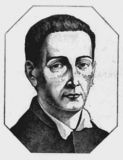On the 3d of December 2007 it is turned 285 since the birth of one of the most prominent representatives of the New Age of Philosophy, the great Ukrainian sage Hryhorii Savych Skovoroda.
This thinker indeed had an endless range of interests. But as for me, the most interesting for the general public of our university is the part where he turned to the issue of creativity (as an engineer, by definition, is a creator).
We fully share the opinion of the scholars, who studied Skovoroda`s works and now state that his most important contribution to the world philosophy was the doctrine of " congenial work". Not family tree, wealth and ranks, but "congeniality" should determine the true dimensions of the person in society and society in the person. In the idea of "congeniality" in a contracted form there are a lot of things that will find its solution and will be resolved in the latest philosophical and psychological, heuristic and didactic-pedagogical studies of the creativity problem: creativity motivation, the problem of vocation, gifts, aptitudes, abilities, talent, genius of the person. The problem of "the person in its proper place." Thus, the problem of “the person that is not in its proper place”...
Who will deny that nowadays similar problems and issues are not so actual requiring their urgent theoretical and practical solution?
After all, the predisposition to a particular type and kind of human activity primarily determines its (activity, work) congenial nature, claims H.S. Skovoroda. Congeniality is the result of man`s choice of his active application terrains and the ability to choose is a necessary condition of human existence in the situation of freedom. And it's no coincidence at all that in the thinking of the philosopher a lot is dedicated to the theme of freedom. When there is no possibility of choice, there is no congeniality.
 This is an illustrative piece of dialogue from "Alphabet” or “Primer of Peace": "Some youngster was my student. The child was genuinely born for philanthropy and friendship, born to hear and make the honest things. But not born to be a student. To my surprise I was sorry that he is so dumbfounded. But as soon as he fell away to the mechanics, so suddenly surprised everyone with his notion without any mentor. "
This is an illustrative piece of dialogue from "Alphabet” or “Primer of Peace": "Some youngster was my student. The child was genuinely born for philanthropy and friendship, born to hear and make the honest things. But not born to be a student. To my surprise I was sorry that he is so dumbfounded. But as soon as he fell away to the mechanics, so suddenly surprised everyone with his notion without any mentor. "
What reasons lead to the situation of "non-congeniality" in which a person gets? Vanity, unbridled greed for property accumulation as the form of wealth, aspiration for titles, ranks and privileges and so on. These are internal incentive factors. But there are some external ones the source of which lies in the unfairly and unjustly arranged society, said the philosopher. The neglect of congeniality, the hypertrophied desire of man to the temptations of the world inculcates the sense of desperation, despair, waiting for death, revenge, anger. Warning against such a perspective, the philosopher strongly held the opinion about the necessity of "listening to yourself", so that going from the depths of human nature desire to congenial work, to " dear to your heart " kind of active life has not been ignored, but was heard. We believe that the idea of "listening to yourself" (as well as a number of other ideas of H.S. Skovoroda regarding this issue) is still waiting for its researchers and successors, and will be further such developed and actual in the modern philosophy of art that will be relevant to the potential that it hides. .
A person is complete (whole, would say scientific philosophy later), happiness, creativity (congenial life style) - these are uniordinal dimensions of personality and society: "Profit is not amusement, but the execution of bodily needs, and if amusement is not internal, but native amusement from heart dwells in congenial work. The sweeter it is, the more congenial it appears...The soul is amused by congenial work ".
Extremely valuable in the views of H.S. Skovoroda on the nature of congeniality as the determining factor of the true human existence is that he is well aware of the social, cultural dependence and personality determinism. In other words, he presented the person as atomized one, and its understanding is another philosophical Robinsonade, but is perceived as an inseparable part of the whole history (mostly,by H.S. Skovoroda –of state). This means, that at least for him were doubtless the conclusion about social nature of the person, and the conclusion that a person can be congenial only in the congenial society. And thus, "dumbfounded " person - in the “dumbfounded” society ". This is so because creativity can be formed only in the creative society. And the reason of ruined slave civilizations and feudal society, based on the serf labor, according to the philosopher, is in the lack of congeniality (in person, in state, in work). The meaning of human existence, therefore, is in the self-searching, and the perfect society should be arranged so as to act as a kind of "midwife", which provides the birth of a complete, "mentally cheerful", happy (in fact - normal) human being. .
In the arguments of H.S. Skovoroda we often find these guides, systematic reflection on a form of which clearly suggests that there were attempts to develop a kind of social pedagogic principles that would provide at "the output" such a person. Significantly, that according to the philosopher, congeniality is not just beautiful, but still exotic, but - congenial work. Namely because of work - the main factor of culture, society existence – is the way to the constitution of congeniality in a virtually universal form. The desire to congenial work , in opinion of thinker, is inherent by nature in each individual, since the nature is the mother of desire, and the latter is " the stirring, inclination and movement. She tends to work and is glad, as to her son... To say briefly, nature lights up to work and strengthens in labor, making labor sweet. "That is why "it is much better and honorable to be an honest shoemaker than unnatural Councillor of State." But none of the three worlds (by his typology), suits to the embodiment of his ideal. "No happiness on earth, no happiness in the sky..." - he wrote in "A Conversation Among Five Travelers Concerning Life's True Happiness".
Perhaps, that`s where the world grief at heart and on the face of sage, who took over on its infinite humanity the atonement for "untrue arranged" world, came from. From here is an irresistible conviction of the necessity and possibility of the arrangement of such life that would be a worthy for person, people and society. And not purely theoretical, but also one that brings into one line with the philosophers who thought, felt and acted in a practical way: Socrates, Spinoza, Fichte, Marx, Lenin ... That`s why, this true sage had to set forth in a journey with a stick in his hands, and carry the word of truth to people about themselves, about their destiny and affliction and warn, warn them. .
That is, in our opinion, on what the style of his works is based on, since therein the newest half-intelligent philosophers tend to see village clumsiness and deliberate moralizing. Meanwhile, we believe that in the global philosophical tradition up to the XVIII century inclusive, we do not see a philosopher that would be even equal to him in the field of the humanistic problems development. And it`s not because the political environment is like that and in a shoal went “Ukrainians for profession." Even among the grandees of European (Western) direction in the philosophical formation of humanism concepts (just let us recall the pleiad of humanist thinkers of the Italian Renaissance) H.S.Skovoroda takes the first place. But another thing is that we till this day haven`t used a thousandth part of precious wisdom that was revealed to mankind by this humanist philosopher. Yes, from time to time we gradually (usually in the "Jubilee mode") react presenting a couple of scientific studies, conducting Skovoroda`s readings, the UNESCO events ... And then (until the next anniversary) we hold forth again on our inferiority, "colonialism" and provinciality. Walking on foot through the pure gold of truth and wisdom.

